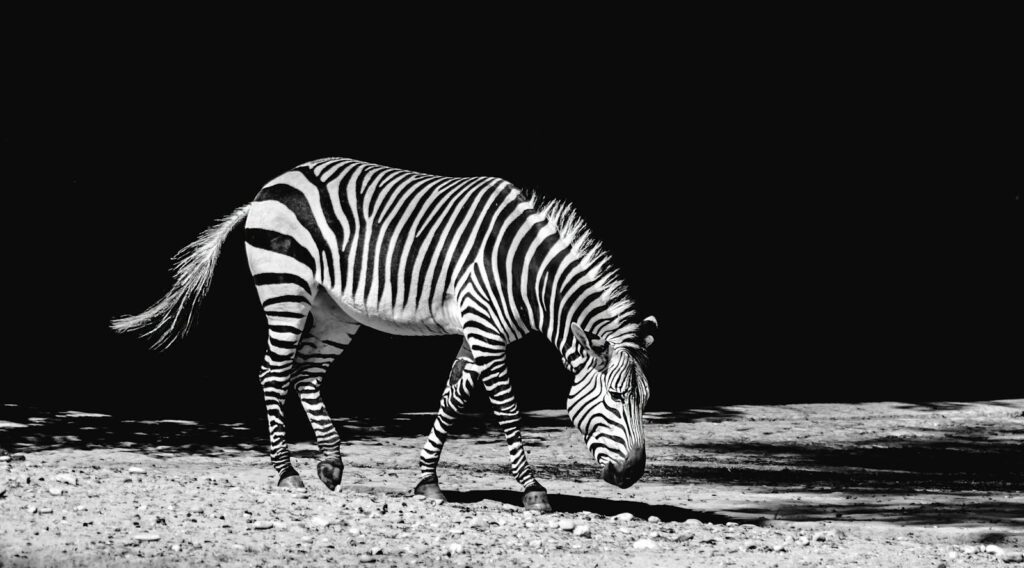In the expansive savanna of Ndutu, Tanzania, an evocative scene captured the essence of nature’s beauty and brutality. Amidst the vibrant herds of zebras and wildebeests, a solitary young zebra lingered, isolated and vulnerable, while the surrounding wilderness teemed with life. This poignant moment served as a powerful reminder of the delicate balance within the wild, illustrating both its chaotic rhythm and the profound solitude that can emerge in the midst of abundance, making one reflect deeply on the circle of life.

A tragic scene in zebra group made me feel heartbreaking.
As we settled into our safari vehicle, the sight of countless zebras mingling together was nothing short of mesmerizing. It was like a mini migration, a spectacle that our guide downplayed, suggesting that the real migration would involve a hundred times more zebras. Yet, for me, the sheer number of these striped creatures was awe-inspiring. The air was filled with their distinctive sounds, a cacophony that was both amusing and enchanting. I found myself giggling at the ruckus they created, a joyful noise that echoed across the landscape, adding to the magic of the moment.
However, amidst this vibrant scene, my attention was drawn to a small drama that unfolded before my eyes. A baby zebra, nearly covered in mud from a recent water crossing, was wandering aimlessly, separated from its mother. My heart sank as I observed this little creature, calling out in vain for a mother who seemed to have vanished into the throng of zebras. It was a simple yet heartbreaking situation that struck a deep chord within me, highlighting the harsh realities of the wild.
The baby zebra walked back and forth, its movements slow and deliberate, as if searching for a familiar face in the sea of stripes. I couldn’t help but empathize with this lost soul, imagining the fear and confusion it must have felt. It was easy to anthropomorphize the situation, to envision the little zebra as a child lost in a crowd, desperately seeking the comfort of a parent. The sight of it standing alone, watching other young zebras reunite with their mothers, was almost unbearable.
I found myself wishing I could intervene, to scoop up this little one and drive it around until we found its mother. The thought of a mother zebra wandering off, oblivious to her child’s plight, filled me with disappointment. Why wouldn’t she come back? Did she not hear the calls of her baby? The guide suggested that the little zebra would likely remain with its herd, trying to survive as an orphan. I pondered whether it was old enough to eat solid food or if it still relied on its mother’s milk, feeling a mix of helplessness and hope.
This experience made me recall the circle of life.
This experience was a stark reminder of the circle of life, a theme I had come to accept during my previous safaris. I had witnessed the brutal realities of nature—predators taking down their prey, the harshness of survival in the wild. Yet, this incident felt different. It was not about the predator-prey dynamic; it was about a child lost in a world that seemed indifferent to its suffering, making me question the fairness of nature.
While I usually focus on uplifting tales filled with wonder and joy, this moment was a necessary part of life’s narrative. It was a reminder that not all stories have happy endings. Sometimes, the sadness is just as profound and deserving of recognition. As I reflected on the little zebra’s plight, I felt a wave of empathy wash over me, a connection that transcended species, reminding me of the shared struggles in the animal kingdom.
To lighten the mood, I captured a few cheerful images of mother ducks navigating through the chaos of zebras with their ducklings, a scene that contrasted sharply with the earlier sadness. It was a reminder that life continues, even amidst sorrow. The sight of an adult zebra alone at the water’s edge, gazing at its reflection, struck me as both melancholic and beautiful—a poetic moment that encapsulated the duality of existence in the wild.

The story of the little zebra poignantly illustrates the fragility of life and the interconnectedness of our experiences. It reminds us that even amidst a crowd, one can feel profoundly isolated. As we traverse our unique paths, let us remain vigilant to those who may feel lost, offering support whenever possible. Life’s tapestry is intricately woven with both joy and sorrow, and every narrative, regardless of its sadness, deserves acknowledgment. In cherishing the beauty of both light and dark, we enrich our understanding of the human experience and foster meaningful connections, creating a more compassionate world.
Related posts:
The fledgling problem
The Scientific Reason You Can’t Stop Watching Baby Animal Videos




